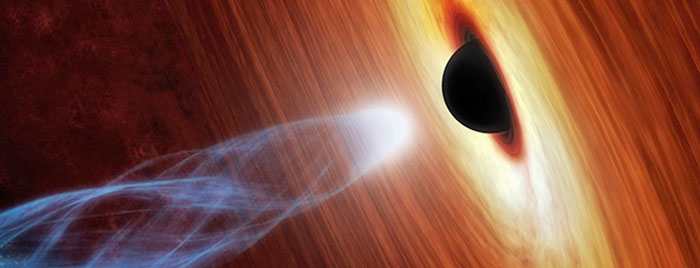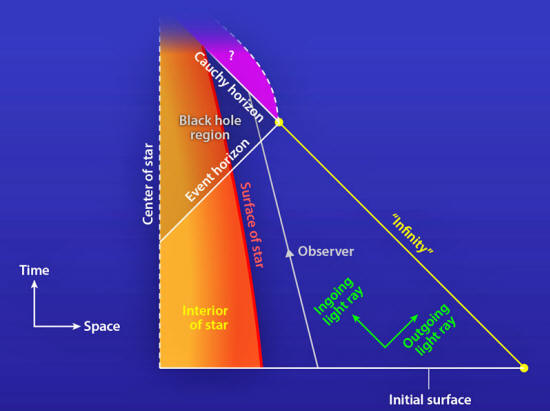|

March 04, 2018
from
Ancient-Code Website
Spanish
version

Image Credit:
NASA/JPL-Caltech
A researcher from the University of California Berkley claims that
there are certain types
of black holes in the cosmos that
can 'press the reset button on history,' sort of speak.
According to experts, these black holes have the ability to reset
the past completely and offer an infinite number of possible
futures.
In the real world, the past uniquely determines the future. If a
physicist knows how the universe began, he has the necessary means
to calculate its future for all time and all space.
However, a UC Berkeley
mathematician has found some types of black holes in which this law
does not apply.
If someone ventured into one of these relatively benign black
holes, he could survive, but his past would be erased, and he could
have an infinite number of possible futures.
Such claims have been made in the past, and physicists have invoked
a "strong cosmic censure" to explain it.
There are two types actually:
Experts suggest that there are certain 'barriers' within black
holes, deeper than the
event horizon, beyond which physics
is entirely canceled out, and nothing can be predicted from there.
Some argue that this barrier seals off troublesome singularities
from the rest of space and time, which in turn prevents their
lawlessness from becoming a pressing issue, note science alert.
However, they note a second cosmic censorship also exists. This one,
a stronger version of cosmic censorship, holds the idea that
physical lawlessness does not exist.
This would require or the
'barrier' to disappear so that physics could live on.
Peter Hintz, a scientist from the University of California,
Berkeley, has his doubts about version number two.
"People had
been complacent for some 20 years, since the mid-'90s, that
strong cosmological censorship is always verified," says
Hinz.
"We challenge
that point of view."
After studying
non-rotating objects called
Reissner-Nordström-de Sitter black
holes, Hintz and his colleagues argue that theoretically, these
mysterious black holes would have a barrier called a
Cauchy horizon.
Beyond this point,
say, experts, there's no cause and effect inside this warped
landscape, and time and space are smeared smoothly into an infinite
instant.

A spacetime
diagram of the gravitational collapse of a
charged spherical star to form a charged black
hole.
An observer
traveling across the event horizon will
eventually encounter the Cauchy horizon, the
boundary of the region of spacetime that can be
predicted from the initial data.
Hintz and his
colleagues found that a region of spacetime,
denoted by a question mark, cannot be predicted
from the initial data in a universe with
accelerating expansion, like our own.
This violates the
principle of strong cosmic censorship.
(Image courtesy of
APS/Alan Stonebraker)
The Cauchy Horizon,
within the event horizon - a boundary beyond which nothing, not even
light nor radiation, can escape, is where determinism breaks down.
This means that it is there where
the past no longer influences the
future.
If someone would
somehow end up venturing into these black holes, he could survive,
but his past would be completely obliterated, and he would face a
number of different possible futures.
"It is no
longer uniquely determined by full knowledge of the initial
conditions," Hintz said. "That is why it's very troublesome."
What life would
be like in a space where the future was unpredictable is
unclear.
"No physicist
is going to travel into a black hole and measure it. This is a
math question. But from that point of view, this makes
Einstein's equations mathematically more interesting," he said.
"This is a
question one can only study mathematically, but it has physical,
almost philosophical implications, which makes it very cool."
"This…
conclusion corresponds to a severe failure of determinism in
general relativity that cannot be taken lightly in view of the
importance in modern cosmology" of accelerating expansion, said
his colleagues at the University of Lisbon in Portugal, Vitor
Cardoso, João Costa and Kyriakos Destounis, and at Utrecht
University, Aron Jansen.
As quoted
by Physics World, Gary
Horowitz of UC Santa Barbara, who was not involved in the
research, said that the study provides,
"the best evidence I know for
a violation of strong cosmic censorship in a theory of gravity and
electromagnetism."
Sources
|



